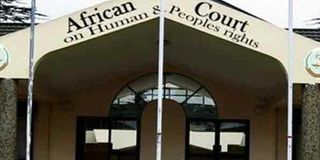African rights court to roll out digital proceedings in cases handling boost

What you need to know:
The African Court on Human and Peoples’ Rights (AfCHPR) this year will digitalize its services as it seeks to improve efficiency in case handling.
The Court, a judicial organ of the African Union (AU) based in Arusha, would continue with a series of reforms initiated since two years ago.
Arusha. Digitalisation of proceedings will be among the priority projects of the African Court on Human and Peoples’ Rights (AfCHPR) this year.
This, according to the president of the court, Justice Sylvain Ore, would improve case handling processes.
“Projects related to digitalization will continue and be completed at least with the respect to the design and initial phase of the transition from manual to digital case management,” he said.
He added that the court, a judicial organ of the African Union (AU) based in Arusha, would continue with a series of reforms initiated since two years ago.
The all-embracing reforms are being carried out from within the organisation and with AU coordination in order to rationalise resources.
The reforms are among efforts being taken to avoid overcrowding the court’s docket given the increasing number of cases filed and determined before it.
According to him, the number of cases handled last year were significantly higher than in 2017, reaching twice the figures of 2016.
“While this result exceeds expectation, AfCHPR’s mission and the current and potential overcrowding of its docket require an increased effort,” he added.
The court will also go ahead with plans to launch its Reparations Guidelines and the Framework for Monitoring Reporting and Implementation of its guidelines.
Justice Ore said strengthening of the legal aid mechanism through the ongoing establishment of legal assistance fund was progressing well.
The legal aid fund is aimed at supporting litigants seeking the services but who cannot afford the costs of filing the case. The process to set it up are said to be in the final stages.
Funds for the facility will be solicited from the AU member states, which have ratified the creation of the court and the development partners.
The amount needed for the seed money has not been revealed. Tanzania promised to raise $100,000 for the fund.




